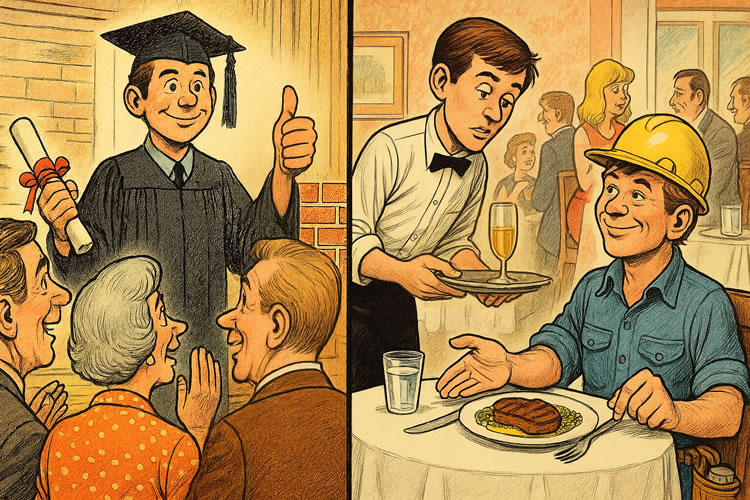Most Jobs Don’t Require a Degree
Despite decades of messaging that a college diploma is essential for success, labor market data and education outcomes suggest otherwise. The U.S. continues to steer a majority of students into higher education pathways, even though most jobs do not require a degree, and many students leave college with debt but no credential.
According to projections from the U.S. Bureau of Labor Statistics, only about 37% of jobs between 2022 and 2032 are expected to require a college degree—25% for a bachelor’s or higher, and roughly 12% for some college or an associate degree. The remaining 63% of projected jobs will require a high school diploma, short-term training, or post-secondary certification.
Most Students Still Enroll Anyway
62% of high school graduates enroll in college immediately after graduation, according to the National Center for Education Statistics (NCES). While some complete a four-year degree, many do not. The six-year completion rate for students at four-year institutions is 62%, and only 32% of community college students finish within three years.
Many Aren’t Academically Ready
An estimated 40–60% of first-year college students are placed into remedial coursework, particularly in math and English. These non-credit-bearing classes are required to reach baseline college-level proficiency and delay degree progress while increasing costs.
Testing data from the National Assessment of Educational Progress (NAEP) and the SAT/ACT suggests that only 20–25% of students enter college with the academic foundation to excel. An additional 20–25% may succeed with moderate support. Roughly half of all high school graduates are not adequately prepared for college-level academics, but enroll anyway.
Degrees Don’t Guarantee the Right Jobs
This mismatch has financial consequences. Many students leave college without a degree but with loan debt. Those who graduate often enter a job market that does not require their credentials. Recent data (Q2 2025) from the New York Fed shows underemployment among recent college grads remains above 41%.
Meanwhile, middle-skill careers—particularly in the trades—continue to experience labor shortages. Jobs such as electricians, CDL truck drivers, welders, and HVAC technicians offer median salaries between $50,000 and $70,000, often without requiring a four-year degree. Many of these roles include apprenticeships or paid training and lead to stable employment with upward mobility. The U.S. Department of Labor reports that graduates of formal, registered apprenticeship programs can expect an average starting salary of $80,000.
If Everyone Has a Degree, Who’s Left to Work?
Critics of the college-for-all model point to a structural flaw: even if every American earned a bachelor’s degree, there would not be a corresponding shift in the economy to absorb them all into higher-paying professional or management roles.
The labor force is not composed of 100% managers. It is structured more like a pyramid—with only a limited number of leadership and supervisory roles, and a much larger base of workers in operational, service, and technical positions. Degrees alone do not expand the number of available leadership jobs.
As degree attainment increases, job requirements have not adjusted upward. Instead, employers frequently fill non-degree jobs with overqualified applicants, while entry-level wages remain flat. The result is a credential inflation cycle where having a degree does not guarantee upward mobility—only eligibility.
🍁 Make a One-Time Contribution — Stand Up for Accountability in Vermont 🍁
A Different First-Year Model
Some policy proposals aim to restructure the entry point into college. One idea involves treating the first year of college as a taxpayer-funded proving ground, similar to the Medicaid model in healthcare. Under this approach, public institutions would receive a flat per-student reimbursement to cover tuition for general education coursework. Private institutions with large endowments would be expected to fund first-year attendance from internal resources.
This model would allow students to explore higher education with reduced financial risk. Those who succeed could continue into upper-level coursework, while others could exit early without burdensome debt. Eligibility could be tied to high school performance or standardized placement testing to ensure basic readiness.
Refocusing High School on Readiness and Choice
At the high school level, reform advocates are calling for a return to proficiency-based graduation standards and expanded access to career and technical education programs. They argue that students should be offered multiple respected pathways—academic, technical, and workforce-oriented—based on demonstrated aptitude and interest.
A Misaligned System
Federal and state policy continues to prioritize traditional college pathways, even though the data shows that only a minority of Americans both need and benefit from a four-year degree. Labor shortages in trades, high college dropout rates, and rising student loan balances all point to a systemic mismatch between education goals and economic structure.
While higher education remains valuable for many, workforce demand is not built around the assumption that everyone becomes a manager. The majority of jobs will always require skilled workers—not just degrees.
Dave Soulia | FYIVT
You can find FYIVT on YouTube | X(Twitter) | Facebook | Parler (@fyivt) | Gab | Instagram
#fyivt #skilledtrades #collegebubble #educationreform
Support Us for as Little as $5 – Get In The Fight!!
Make a Big Impact with $25/month—Become a Premium Supporter!
Join the Top Tier of Supporters with $50/month—Become a SUPER Supporter!









Leave a Reply to grandballoon2c123d9754Cancel reply